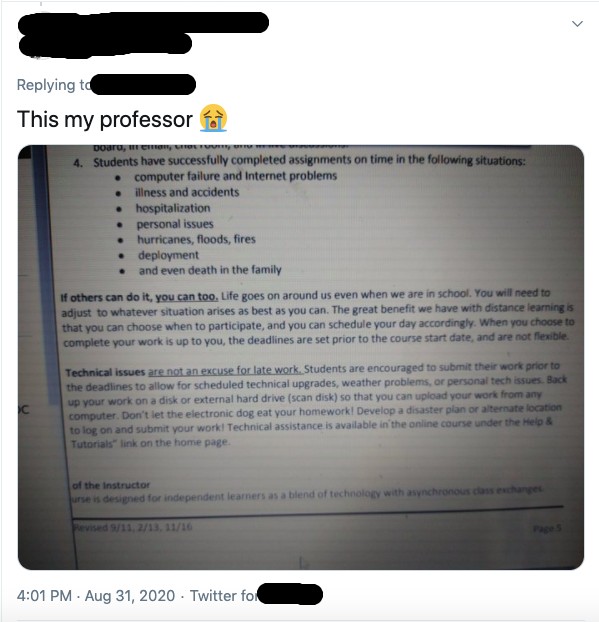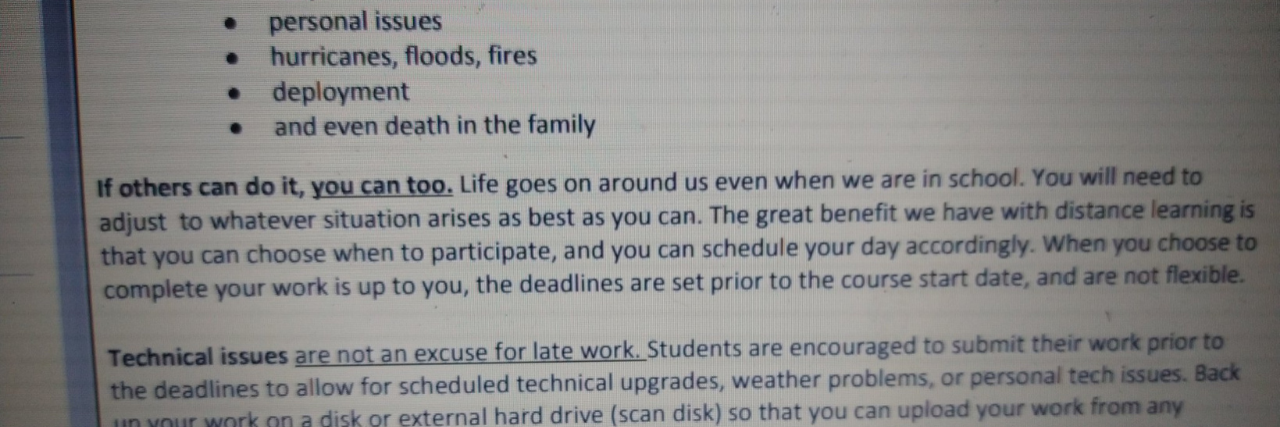Discussions surrounding course policies and virtual learning amid the COVID-19 pandemic have surfaced on social media and other academic discourses. A classroom syllabus is one of the central tools that can assist during these transitions. It lays out course expectations, assignments and scheduling so students can better utilize and manage their time, workload and organization strategies.
During a pandemic, it is only fair and human to expect a reasonable syllabus that fits the situation. While many professors have been accommodating and understanding during these circumstances, unfortunately, that is not always the case. Take, for example, one syllabus that surfaced on Twitter, which includes the following expectations:
Students have successfully completed assignments on time in the following situations:
- computer failure and Internet problems
- illness and accidents
- hospitalization
- personal issues
- hurricanes, floods, fires
- deployment
- and even death in the family
If others can do it, you can too. Life goes on around us even when we are in school. You will need to adjust to whatever situation arises as best as you can. The great benefit we have with distance learning is that you can choose when to participate, and you can schedule your day accordingly. When you choose to complete your work is up to you, the deadlines are set prior to the course start date, and are not flexible. Technical issues are not an excuse for late work.

This syllabus is the reality for some college students right now. While this example is quite extreme, it is not uncommon to encounter any degree of inequity in the classroom relating to disability, social class, race and life circumstances, even before the pandemic.
While an important issue to address overall, we need to highlight the way the barriers built into education disproportionately impact certain students. Disability, illness, financial circumstances, death in the family, disasters and other issues are not mutually exclusive experiences and often relate to or compound each other. Sometimes, these factors will interfere with college, even with personal planning and scheduling. Instead of view them as merely an individual problem, it is crucial professors understand the broader social and systemic problems.
For example, disabled people and Black people, Indigenous people, and People of Color are more likely to be impacted by biases and financial and racial disparities that impact access to quality of education, technology devices, internet services and financial resources. Likewise, scheduling is particularly difficult for students on certain treatment schedules or students who live with an unpredictable chronic condition or medication side effect.
The syllabus in this case makes numerous harmful assumptions:
- It assumes how “adjust to whatever situation arises as best as you can” can be defined. Adjustments will look different per individual circumstance.
- It assumes students’ access to resources and supports and their mental health status.
- It assumes alternative locations are always an option. It not possible for many students to simply plan for an alternative location to submit work, as that often requires accessible transportation, a babysitter, and access to a public library or other space.
- It assumes the health and well-being of the student. If a student is hospitalized, it is unlikely they will be well enough to submit their work.
- It assumes someone can afford or has access to technology devices or internet services of certain quality.
- It assumes “technical assistance” is in an accessible format for all students.
- It assumes none of the listed situations will impact someone physically or emotionally “enough” to interfere with school.
- It assumes someone has access to health care and health insurance.
- It assumes deadlines and homework must be prioritized above death, illness, trauma, disasters and other life circumstances.
Taken together, none of these circumstances should be subject to scrutiny to justify accommodations. Students are not obligated to readily reveal personal details of their lives. To presume someone must reveal personal life matters to be deemed suitable and believable is rooted in discriminatory beliefs about people’s bodies, minds and social experiences — and the perceived right to this information.
The disability studies field refers to a form of forced disclosure as forced intimacy. As defined by disability justice activist Mia Mingus, it “refer[s] to the common, daily experience of disabled people being expected to share personal parts of ourselves to survive in an ableist world. This often takes the form of being expected to share (very) personal information with able bodied people to get basic access.”
Forced intimacy challenges the default assumption of disbelief and nondisabled-ness built into our culture. It also challenges the assumption that individual responsibility and planning omits any need for accessible, accommodating and flexible education. It should not be glorified to work and push beyond what’s reasonable. Sayings such as “no excuses!” are often romanticized in our culture, when real life complexities, individual experiences and social factors are not considered.
When educational classrooms have inaccessible policies such as the ones on full display in this syllabus, they maintain inequities in education and in the workplace. It perpetuates hierarchies based on someone’s access to resources, health and disability status, race, and other life circumstances. In the end, some people experience barriers put in place, which contribute to the disproportionately lower rates of disabled and BIPOC in workplaces, education programs and representation. Other people who do not experience these barriers are privileged without them
I encourage people to challenge some of the defaults our culture has conditioned us to maintain, and reflect on how that relates to educational structures, workplaces and daily interactions in public spaces.
Header image via Twitter (used with permission)

